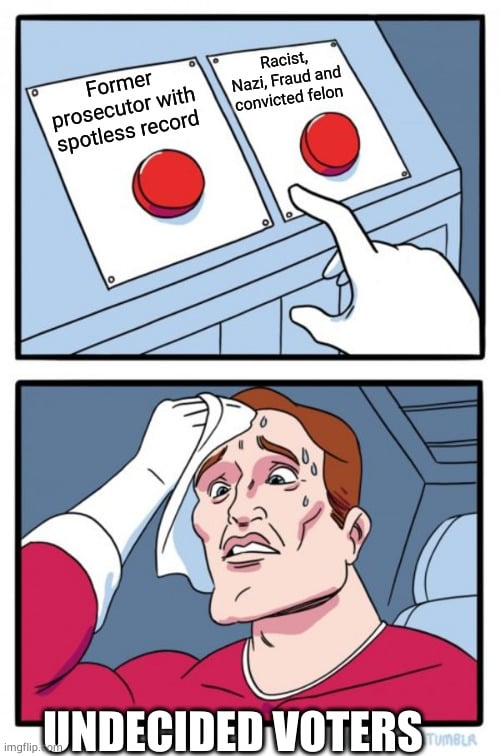this post was submitted on 30 Oct 2024
1275 points (93.9% liked)
Political Memes
7852 readers
3497 users here now
Welcome to politcal memes!
These are our rules:
Be civil
Jokes are okay, but don’t intentionally harass or disturb any member of our community. Sexism, racism and bigotry are not allowed. Good faith argumentation only. No posts discouraging people to vote or shaming people for voting.
No misinformation
Don’t post any intentional misinformation. When asked by mods, provide sources for any claims you make.
Posts should be memes
Random pictures do not qualify as memes. Relevance to politics is required.
No bots, spam or self-promotion
Follow instance rules, ask for your bot to be allowed on this community.
No AI generated content.
Content posted must not be created by AI with the intent to mimic the style of existing images
founded 2 years ago
MODERATORS
you are viewing a single comment's thread
view the rest of the comments
view the rest of the comments

I'll point back to you saying this:
Which is, for lack of a better way to put it, simply bullshit.
I'll also point to you saying this:
Which sounds like willful ignorance about the election process. I don't think that's a position to be proud of.
You ask why we even have electors at all, as if that's some sort of big "gotcha" monent. I already clearly stated that I don't think it's a particularly good system, especially coupled with FPTP and winner-talke-all. What it is, though, is the system we have, so understanding it is pretty vital.
Technically speaking, no, you do not directly vote for a presidential candidate in the general election. In practice, your vote almost certainly will be represented by the electors you vote for if your chosen candidate wins your state or if you live in Nebraska or Maine. Certainly, the electors could be removed entirely from the process while electoral votes remain. That would remove one unnecessary part of the equation, but would it solve anything?
Here's the real fun: winner-take-all. It's more damaging than indirect election. Let's pretend you live in one of three districts that vote for (electors pledged to) Alice, one in a landslide and two hotly contested. But the other two districts in your state elect (electors pledged to) Bob. The statewide popular vote is close but slightly in favor of Bob. Congrats, all seven of your states EC votes go to Bob even though your district overwhelmingly supported Alice, and she won 60% of the districts. Who needs faithless electors when your vote can truly not count for anything? This is how WTA is worse for democracy than electors.
Okay now let's imagine we did have awesome candidates to choose from not just Kamela, the orange back of peanut Grease and the several others in the list that were never mentioned except for a couple of times when they explained why only Kamela and Trump were in the debates. If let's say we had two really strong republicans that could get democratic votes against two really strong democrats who could easily get republican votes...how could my vote as a Democrat count at all if I voted for one of the republicans but then I happened to be in a democratic state like Texas (lol. Let's pretend Texas had mostly democratic electors). Like you mentioned, the electoral vote would be winner takes whatever...all or some. My individual vote is either diluted via population and number of representatives per stated, or eaten up by Jerrymandering or whatever. I say fuck the electoral college, count all the damn votes and make the popular vote win.
Having some sort of mechanism that requires attention to be paid to areas other than high-population centers is probably a good thing. In the system we have now, it swings too far in the other direction by giving some disproportionate power to small pop red states and even more to battleground states. A shift away from WTA, along with replacing FPTP with STAR voting, would be more impactful than abolishing the EC. Even better would be adjusting the size of the House to better normalize the population of districts.
There have been hundreds of attempts to abolish or change the EC. It's really looking like our best options for real reform are STAR voting and proportional representation.